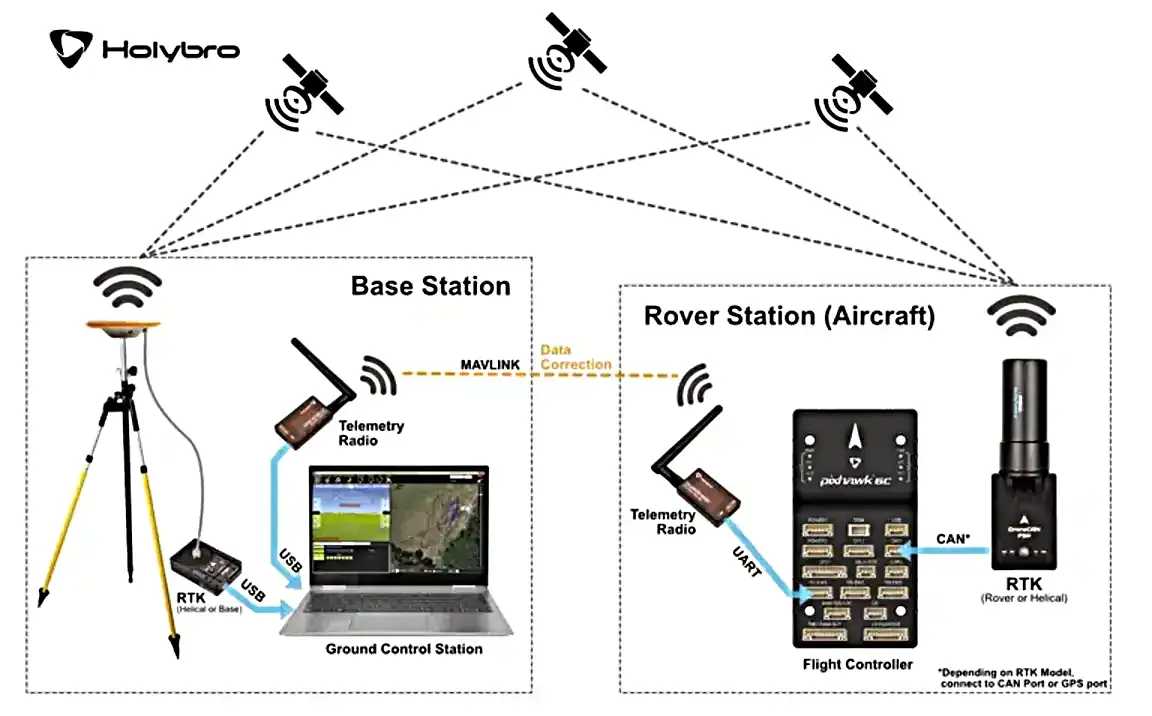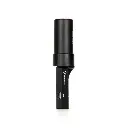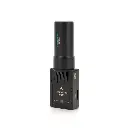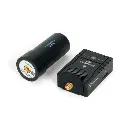DroneCAN H-RTK F9P
Unlock localization superpowers!
The DroneCAN H-RTK F9P is the latest differential high-precision GNSS positioning system from Holybro. It has adopted the DroneCAN protocol for communication. It provides multi-band RTK with fast convergence times and reliable performance, concurrent reception of GPS, GLONASS, Galileo, and BeiDou, and a fast update rate for highly dynamic and high-volume applications with centimeter accuracy.
With the adoption of the DroneCAN Protocol, it has up to an 8 Hz navigation update rate, upgradeability, noise immunity, and real-time features, and is more robust than UART due to its increased resistance to electromagnetic interference. It does not occupy any serial port of the flight controller, and multiple CAN devices can be connected to the same CAN bus via a hub.
The DroneCAN H-RTK F9P uses a u-blox F9P module, a BMM150 compass, and a tri-colored LED indicator, and is equipped with the STM32G4 processor running at 170 MHz with 512 KByte Flash and 96KByte RAM. It supports DroneCAN firmware upgrades via the DroneCAN GUI Tool. It is compatible with the open-source Pixhawk series flight controller.
DroneCAN H-RTK F9P Helical
This model uses a helical antenna, which has slightly better performance in space with obstructions than the Rover version. The antenna of this module can either be attached to the module directly or connected via a SMA cable, giving you the ultimate flexibility. It also has a UART2 port exposed, allowing you to do YAW/Heading (aka moving baseline).
This model can be used either on the rover (aircraft) or as a base station. However, when used as a Base Station, RTK communicates with the Ground Control Station via USB, so the DroneCAN protocol is not used. You can consider using the standard H-RTK F9P Helical or Base for your Base Station.
SPECIFICATION
Intended Application | Rover (aircraft) or Base station |
GNSS Receiver | U-blox ZED-F9P high precision GNSS module |
Processor | STM32G473 |
Magnetometer | BMM150 |
GNSS | BeiDou, Galileo, GLONASS, GPS / QZSS |
GNSS Band | B1I, B2I, E1B/C, E5b, L1C/A, L1OF, L2C, L2OF |
Positioning accuracy | 3D FIX: 1.5 m / RTK: 0.01 m |
Communication Protocol | DroneCAN 1Mbit/s |
Antennas Peak Gain (MAX) | L1: 2dBi L2: 2dBi |
Time-TO-First Fix | Cold start: ≤25s Hot start: ≤1s |
Navigation Update Rate | RAW: 20Hz Max RTK: 8Hz Max Moving Base RTK: 5Hz Max |
Cable Length | N/A |
Antenna Connection Type | Board: SMA female Antenna: SMA male |
Working voltage: | 4.75V~5.25V |
Current Consumption | ~250mA |
Dimensions | Board: 51.1*35*22.9mm Antenna Diameter: 27.5mm Antenna height: 59mm |
Weight | 58g |
Operating Temperature | -20℃ to 85℃ |
SAMPLE WIRING DIAGRAM








